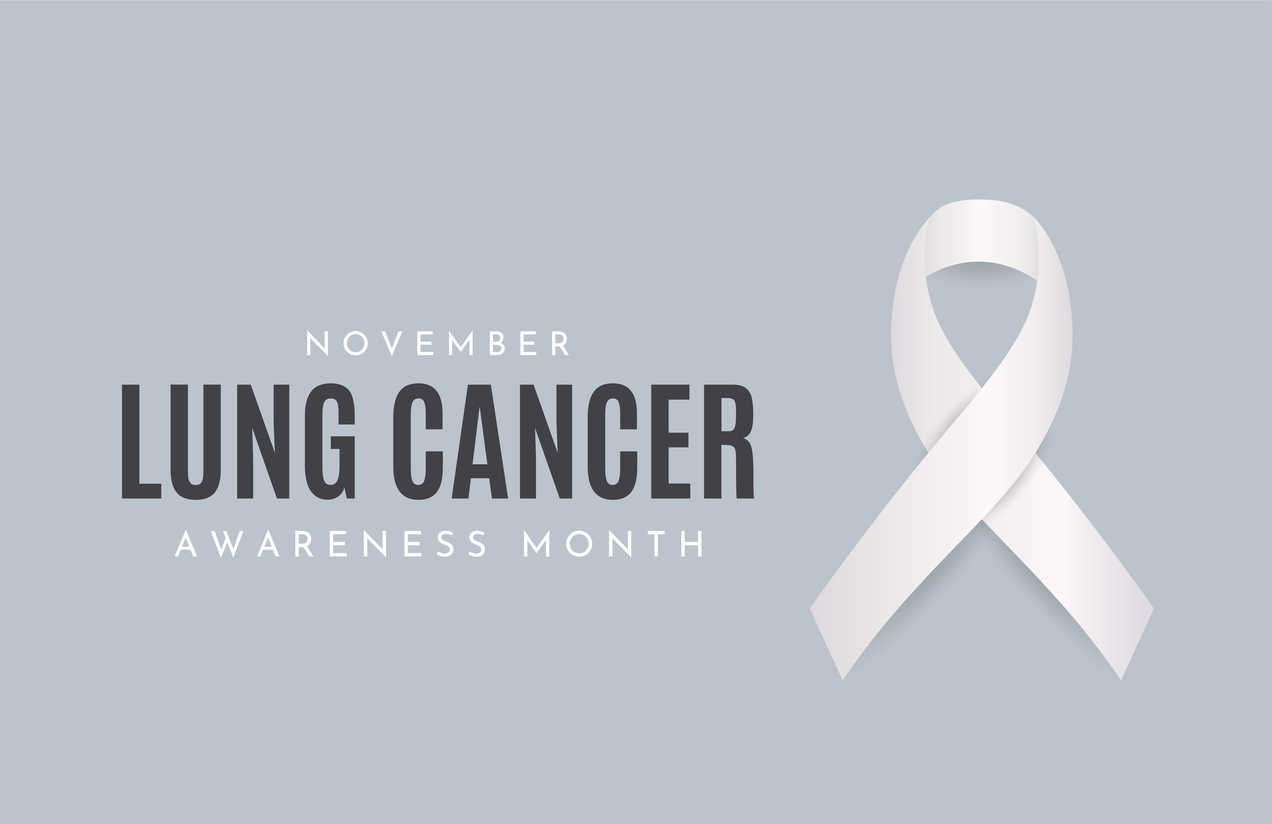Commitment + Clinical Leadership = Better Outcomes

12 Facts About Lung Cancer
November is Lung Cancer Awareness Month. Here are 12 facts about lung cancer to help you learn more and spread awareness.
Smoking causes cancer
Research shows 9 out of every 10 lung cancer cases are caused by smoking cigarettes. Not smoking, or quitting smoking, is the best step someone can take to reduce their risk of getting lung cancer. Not only does smoking cause cancer, but the harmful toxins found in cigarettes prevent your body from being able to fight it.1
Secondhand smoke can cause cancer
Secondhand smoke is smoke from other people’s cigarettes, pipes, or cigars around you. Secondhand smoke can cause cancer in people who have never smoked before. Exposure to secondhand smoke can increase your risk of lung cancer by 20-30%.1
Radon can cause lung cancer
Radon is considered the second leading cause of lung cancer in the United States, and it is estimated to cause thousands of deaths each year. Radon is a gas that naturally comes from rocks and soil, and you cannot see, smell, or taste it.1
If there are cracks or gaps in the foundation of buildings or houses, radon can come through and people breathe it in without knowing. The only way to know if a house or building is affected by radon is by testing it.
Lung cancer is the most common cancer
Lung cancer is the most common cancer worldwide. There are millions of new cases each year, with 2.1 million cases being reported in 2018.2
Lung cancer is the leading cause of cancer death
Lung cancer is the leading cause of death by cancer and makes up 25% of cancer deaths.3 Lung cancer takes more lives each year than breast, colon, and prostate cancer combined.4
Lung cancer is categorized under two main types
Small cell lung cancer typically occurs in those who smoke and is less common. Non-small cell lung cancer is a larger, more general type that includes squamous cell carcinoma, adenocarcinoma, and large cell carcinoma.5
There is no cure for lung cancer
Currently, there is no cure for lung cancer. However, there are treatments and ongoing research to learn more and make it possible for those with lung cancer to live longer.6
Lung cancer has similar symptoms to other health issues
Most symptoms that are associated with lung cancer are also associated with other health issues such as pneumonia, bronchitis, asthma, heart issues, and COVID-19. This can make it difficult to diagnose until being tested for cancer, which is often overlooked until other conditions are ruled out.7
Early diagnosis is the best chance for being treated
Only 16% of people are diagnosed with lung cancer in the early stage when it is the most treatable. If lung cancer runs in your family, or if you experience a chronic cough, chest pain, weight loss, or blood when you cough, get tested as soon as possible.
Symptoms of lung cancer may not appear until a later stage
Symptoms of lung cancer sometimes do not appear until the cancer is in a later stage, which can make it more difficult to treat. If there are symptoms, they can resemble a respiratory infection.8
There are different stages of lung cancer
Small cell lung cancer and non-small cell lung cancer have different stages. Non-small cell lung cancer is distinguished between stage 0 and stage 4. Small cell lung cancer is classified as limited or extensive, which refers to whether the cancer is in the lungs or if it has spread.8
Some criteria can help determine if a person should be screened
Because symptoms of lung cancer may be so similar to other health conditions, testing for cancer is often the last resort. However, if someone meets certain criteria, they should be screened for cancer, including:
- Between 55 and 80 years old
- History of heavy smoking
- Currently smoke or quit smoking within the last 15 years
If someone meets this criteria, they should check with their insurance because the screening may be covered.
Continue to Learn about Lung Cancer
Now that you know more lung cancer facts, you can continue to educate yourself about symptoms and raise awareness for those who are affected.
Click here to visit the American Cancer Society’s website to learn more about lung cancer and what you can do to help.
Saber Healthcare is an organization dedicated to providing consultant services to long-term care providers. This article is for informational purposes and is not meant to be seen as professional advice. Please consult with a medical expert before relying on the information provided.
Sources
- https://www.cdc.gov/cancer/features/lung-cancer.html?CDC_AAref_Val=https://www.cdc.gov/cancer/dcpc/resources/features/lungcancer/index.htm
- https://www.lung.org/lung-health-diseases/lung-disease-lookup/lung-cancer/resource-library/lung-cancer-fact-sheet.
- https://www.cancer.org/cancer/lung-cancer/about/key-statistics.html.
- https://www.dosomething.org/us/facts/11-facts-about-lung-cancer.
- https://www.lung.org/lung-health-diseases/lung-disease-lookup/lung-cancer/basics/lung-cancer-types#:~:text=What%20Are%20the%20Types%20of,cell%20lung%20cancer%20(NSCLC).
- https://lcfamerica.org/lung-cancer-info/lung-cancer-statistics/#1543338163380-b2df265a-237f.
- https://www.verywellhealth.com/diseases-that-mimic-lung-cancer-5221972.
- https://www.medicalnewstoday.com/articles/323701.
